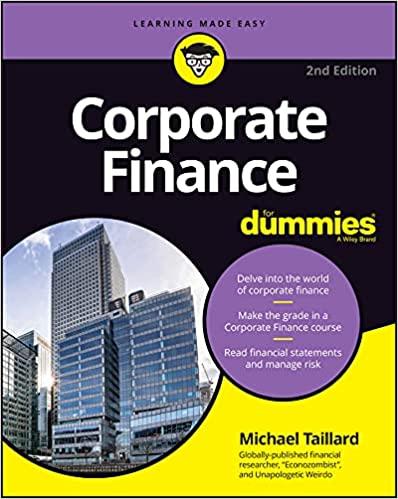Question
As you know, municipal bonds (Munis) are a tax-exempt investment alternative in the case of federal taxes and in the case of most state and
As you know, municipal bonds (Munis) are a tax-exempt investment alternative in the case of federal taxes and in the case of most state and local taxes. Despite a relatively low rate of return, Munis size up well when taxes are taken into consideration. Outside of your company pension plan, lets assume a relative passes away and leaves you a $30,000 inheritance. Your three alternatives are a Muni that pays 5%, a CD that pays 1.2% and a corporate bond that pays 6.5%, all compounding annually. Assuming you are in the 28% tax bracket, calculate the after-tax return on your investment for each alternative. You are calculating a 5-year rate of return. Which do you choose and why?_________________________________
|
|
| Muni | CD | Corporate Bond |
| A | Invested Amount | $30,000 | $30,000 | $30,000 |
| B | Interest Rate | 5% | 1.2% | 6.5% |
| C | Return on Invested Amount | $ | $ | $ |
| D | Tax on interest income (return) | $ | $ | $ |
| E | After-tax return on Invested Amount | $ | $ | $ |
4. There is good and bad debt. What constitutes each kind? Good debt is _______________________________________________________________________________________________________________________________________________________________
Bad Debt is _______________________________________________________________________________________________________________________________________________________________
Suppose you owe $12,000 on your credit card with a 18% APR. You have an opportunity to refinance your home and you could pull out some equity to pay off the credit card and add the debt into the new home loan at 3.5% APR. What is the:
Annual Interest paid to credit card company? $_____________________
Is this interest tax deductible? ______________
Annual Interest paid (of the $12,000) debt with the home loan? $______________
Is this interest tax deductible? _ __________
Assuming you are in the 28% tax bracket, what is your after-tax SAVINGS if you pay down the $12,000 debt in your home loan? $__________________
What is your after-tax savings of the interest if you choose to pay off the credit card and put the $12,000 into your home loan? $__________________
Step by Step Solution
There are 3 Steps involved in it
Step: 1

Get Instant Access to Expert-Tailored Solutions
See step-by-step solutions with expert insights and AI powered tools for academic success
Step: 2

Step: 3

Ace Your Homework with AI
Get the answers you need in no time with our AI-driven, step-by-step assistance
Get Started


